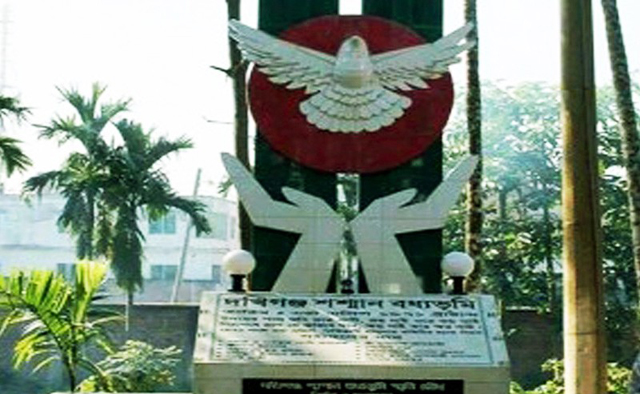
By Md Mamun Islam
RANGPUR, March 29, 2023 (BSS) - Understanding spirit of the independent-seeker brave Bangalees, the Pakistani occupation army began committing planned genocide endlessly in Rangpur like across the country since the beginning of volatile March in 1971.
"Rangpur people became angry since Pakistani junta Yahiya Khan cancelled on March 1 the scheduled parliament session on March 3, 1971 and declared curfew on the day," said former District Unit Commander of Bangladesh Muktijoddha Sangsad heroic freedom fighter Mosaddek Hossain Bablu.
Father of the Nation Bangabandhu Sheikh Mujibur Rahman vehemently rejected cancellation of the scheduled parliament session and called strike on March 2 in Dhaka and on March 3 in the country.
Tens of hundreds of Bangalees of Rangpur brought out massive protest processions on local streets breaking curfew as part of the nationwide non- cooperation movements against the Pakistani regime and sacrificed three brave sons on March 3 in the city.
"The occupation forces got frightened when the brave Bangalees broke curfew in Rangpur sacrificing three heroic sons Sangku Samajhder, Abul Kalam Azad and Omar Ali on March 3, 1971," Bablu, also incumbent Rangpur District Council Chairman, said.
"The occupation forces started committing genocide of intellectuals, politicians, Musollis and common people irrespective of caste, creed and religion to eliminate the Bengali nation from this fertile soil," Bablu said.
According to the book 'Mukitjuddhe Rangpur' written by heroic freedom fighter-com journalist Mukul Mostafiz, the Pakistani hyenas with local collaborators, including Beharis, caught 11 Bangalee intellectuals and took them to Rangpur cantonment on March 27, 1971.
Later on April 4, 1971, the Pakistani occupation forces with their local collaborators took them to 'Dakhiganj Shwashan' in the city and gunned them down to make the Bengali nation talentless.
One of them, the then Awami League leader Dr. Dinesh Chandra Bhowmick alias Mantu Daktar, who received severe injuries as eight bullets penetrated his body, luckily escaped death despite indiscriminate firing at him along with others.
"Later, he joined the Mukti Bahini after getting proper treatment in India and fought the War of Liberation to liberate the country," the book writes.
The 10 martyrs are: Advocate Mahfuz Ali Zorjes, Durga Das Adhikari, Dhirendranath Shanti Chaki, Khitish Halder, Gopal Chandra, Ehsanul Haque Dulal, Tofazzal Hossain Moharram, Rafikul Islam Rafique, Uttam Kumar Adhikari and Pagla Darbesh.
As per their gruesome plan, the occupation forces committed genocide of 32 Musollis of Lahirirhat Mosque in the outskirts of the city after Juma prayers on May 7, 1971 uncovering their masks and revealing real faces towards Islam, the religion of peace.
The books 'Mukitjuddhe Rangpurer Itihas' published by Rangpur district administration and 'Mukitjuddhe Rangpur' written by Mukul Mostafiz narrated the barbaric genocide of the 32 Musollis on that day.
"The occupation forces with local collaborators came by four trucks and got down in front of Lahirirhat Mosque and soon started catching the Musollis just after the Friday Juma prayers on May 7, 1971," said local eye-witnesses Md. Rafiul Islam.
Another local eye-witness Md. Aftab Hossain said, "After killing of the Musollis at Lahirirhat, the occupation army with their non-Bengali Behari collaborators buried the bodies into a mass grave there and left the area."
The gruesome killing of the Musollis of Lahirirhat Mosque just after Juma prayers created severe anger, especially among the Muslims and other communities inspiring them to go to India en-masse to join the Mukti Bahini.
Talking to BSS, Chairman of local Chandanpat union parishad Md. Amenur Rahman said the barbaric genocide of the 32 Musollis at Lahirirhat literally unmasked the so called 'religious' face of the Pakistani junta.
"The Lahirirhat genocide helped the Bangalees to easily and instantly understand the propaganda conducted by the then Pakistani junta of saving Islam from the enemies was quite false," he said.
Heroic freedom fighter Md. Matiar Rahman said the then political and student leaders played crucial roles in organising the War of Liberation against the Pakistani occupation forces following their planned genocide in Rangpur.
"Unremitting genocide of the occupation forces inspired every independence-seeker Bangalee irrespective of caste creed and religion to join the Mukti Bahini en-masse to ultimately achieve the independence on December 16, 1971," Rahman added.